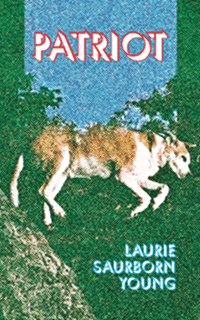A Review of Patriot, by Laurie Saurborn Young
 Patriot
Patriot
by Laurie Saurborn Young
Forklift, Ohio
32 pages / $5 Buy from Forklift, Ohio
Laurie Saurborn Young’s chapbook, Patriot, is a book of horizons, a book of lines – “of thunderstorms on the weather map,” of women on treadmills, of two hundred beer cans on the wall of a fourteen-year-old, of water towers and shuttered factories, of fighter planes above a parking lot in New England, of telephone poles and road kill, of “voters turned away.” The poems, thirteen total, each composed of twenty-six double-spaced lines, are each named “Patriot,” the same name as the book. This formal orderliness, along with the speaker’s measured yet persistent voice and the rank-and-file American subject matter, is in wonderful counterpoint to the great chaos of America inside the chapbook’s stapled pages. The speaker struggles to expand the definition of America, of course; but these are not Whitmanesque poems. Instead, there is a fierce constriction both in the music and imagery of these often-heavily enjambed lines, which create a shard-like collage of “America,” the place where the speaker struggles to locate herself.
The speaker of Patriot is decidedly female, and the theme of misogyny runs throughout the chapbook. The recurring image of the voting booth during an election year helps establish a sense of national urgency, and reminds the reader, specifically, of the 2012 presidential election, in which women’s rights were in the political spotlight, as right-wing politicians attacked the rights of women on multiple fronts. The speaker says, “Still throwing women in the water to see if is America.” Here, as in many of the lines of these poems, the poet uses epistrophe to delay the phrase we come to expect: “is America.” It’s a kind of reversal of Ginberg’s “America,” and gives the poems a much more feminine, feminist energy. The poems are bold, but they are not cocky or smug. They are not shouting at us. The inverted syntax and enjambments allow us to hear the internal voice of an American woman who feels genuine fear for her safety and her rights. The labyrinthine twists and turns in these poems are like a skier on a slalom – which is the exact metaphor Polish director Kristof Kieslowski used to describe what is was like to make films subject to strict censorship. In fact – and surprisingly – Kieslowski said that censorship helped him make better films. While Young’s poems are not subject to state censorship, we can hear the anxiety of utterance in this voice. These poems may at times sound cautious, but they are not afraid. On the contrary, they speak with candor, a seething anger, great intelligence, and a mesmerizing lyricism.
June 17th, 2013 / 11:00 am
